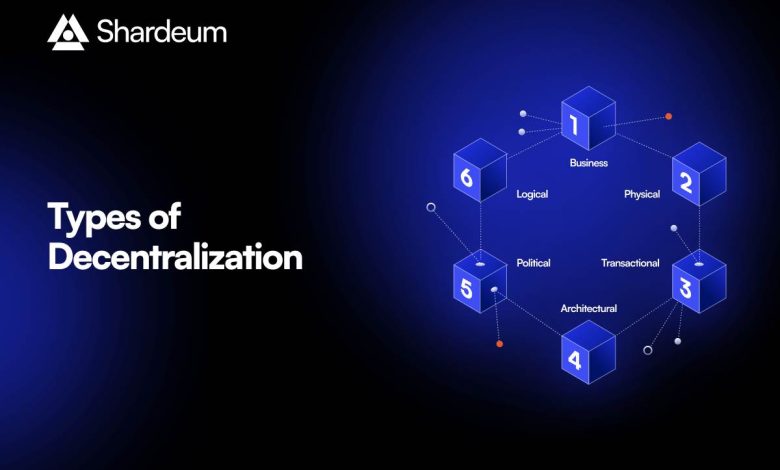Understanding the Role of Decentralization in Blockchain

- Exploring the concept of decentralization in blockchain technology
- The importance of decentralization for security and transparency in blockchain
- How decentralization enhances trust and eliminates the need for intermediaries
- Challenges and benefits of implementing decentralized systems in blockchain
- The role of consensus mechanisms in maintaining decentralization in blockchain networks
- Future implications of decentralization on the evolution of blockchain technology
Exploring the concept of decentralization in blockchain technology
Blockchain technology has gained significant attention in recent years due to its potential to revolutionize various industries. One of the key concepts that underpins blockchain technology is decentralization. Decentralization refers to the distribution of control and decision-making across a network of nodes, rather than relying on a central authority. This distributed nature of blockchain networks offers several advantages, including increased security, transparency, and resilience.
Decentralization in blockchain technology ensures that no single entity has control over the entire network, making it more resistant to censorship and tampering. By spreading out control among multiple nodes, blockchain networks are less vulnerable to attacks and manipulation. This distributed architecture also enhances transparency, as all transactions are recorded on a public ledger that is accessible to all network participants.
Furthermore, decentralization in blockchain technology promotes resilience by eliminating single points of failure. In a decentralized network, even if some nodes fail or are compromised, the network as a whole can continue to operate smoothly. This redundancy and fault tolerance make blockchain networks highly reliable and robust.
Overall, exploring the concept of decentralization in blockchain technology reveals its transformative potential in reshaping traditional systems and processes. By leveraging the power of decentralization, blockchain technology offers a new paradigm for trust, security, and efficiency in various applications, from finance to supply chain management. As the adoption of blockchain technology continues to grow, understanding the role of decentralization will be crucial for unlocking its full benefits.
The importance of decentralization for security and transparency in blockchain
Decentralization plays a crucial role in ensuring security and transparency in blockchain technology. By distributing control and authority across a network of nodes rather than relying on a central authority, blockchain systems become more resilient to attacks and manipulation. This distributed nature makes it difficult for any single entity to compromise the integrity of the system, enhancing security.
Furthermore, decentralization promotes transparency by allowing all network participants to view and verify transactions on the blockchain. This transparency helps to build trust among users as they can independently verify the validity of transactions without relying on a central authority. This increased level of transparency also reduces the risk of fraud and corruption within the system.
Overall, decentralization is essential for maintaining the security and integrity of blockchain networks. It ensures that no single point of failure exists, making it harder for malicious actors to exploit vulnerabilities. Additionally, the transparency provided by decentralization fosters trust among users and promotes a more open and honest ecosystem for conducting transactions.
How decentralization enhances trust and eliminates the need for intermediaries
Decentralization plays a crucial role in enhancing trust and eliminating the need for intermediaries in blockchain technology. By distributing control and decision-making across a network of participants rather than relying on a central authority, decentralization promotes transparency and accountability.
One of the key benefits of decentralization is that it reduces the risk of fraud and manipulation. Since data is stored on a distributed ledger that is accessible to all network participants, it becomes nearly impossible for any single entity to alter the records without being detected. This increased level of transparency helps to build trust among users and eliminates the need for intermediaries to validate transactions.
Furthermore, decentralization also enhances security by removing single points of failure. In a centralized system, if the central authority is compromised, the entire network is at risk. However, in a decentralized system, the network remains secure even if some nodes are compromised, as the majority of nodes would need to be compromised to impact the integrity of the system.
Overall, decentralization in blockchain technology not only improves trust and security but also promotes inclusivity and democratization. By empowering individuals to participate in decision-making processes and removing barriers to entry, decentralization fosters a more open and equitable ecosystem for all participants.
Challenges and benefits of implementing decentralized systems in blockchain
Implementing decentralized systems in blockchain comes with its own set of challenges and benefits. Let’s explore some of the key aspects to consider when moving towards a decentralized model in blockchain technology.
**Challenges:**
1. **Scalability:** One of the main challenges of decentralized systems in blockchain is scalability. As the network grows, it becomes increasingly difficult to process transactions quickly and efficiently.
2. **Security:** Ensuring the security of a decentralized system is another major challenge. With multiple nodes involved, the risk of cyber attacks and vulnerabilities increases.
3. **Governance:** Decentralized systems often face governance issues, as decision-making processes can become complex and fragmented without a central authority to oversee them.
4. **Interoperability:** Achieving interoperability between different decentralized systems can be a challenge, as each system may have its own protocols and standards.
**Benefits:**
1. **Transparency:** Decentralized systems offer a high level of transparency, as all transactions are recorded on a public ledger that is accessible to all participants.
2. **Resilience:** Decentralized systems are more resilient to failures and attacks, as there is no single point of failure that can bring down the entire network.
3. **Censorship resistance:** Decentralized systems are inherently resistant to censorship, as there is no central authority that can control or manipulate the network.
4. **Autonomy:** Participants in a decentralized system have more autonomy and control over their own data and assets, without having to rely on intermediaries.
In conclusion, while implementing decentralized systems in blockchain may pose challenges in terms of scalability, security, governance, and interoperability, the benefits of transparency, resilience, censorship resistance, and autonomy make it a compelling choice for many organizations looking to leverage the power of blockchain technology.
The role of consensus mechanisms in maintaining decentralization in blockchain networks
The consensus mechanisms play a crucial role in maintaining decentralization within blockchain networks. These mechanisms are responsible for ensuring that all participants in the network agree on the validity of transactions and the state of the ledger. By achieving consensus, blockchain networks can operate in a trustless environment without the need for a central authority.
One of the most common consensus mechanisms used in blockchain networks is Proof of Work (PoW). In PoW, participants known as miners compete to solve complex mathematical puzzles to validate transactions and add new blocks to the blockchain. This process requires a significant amount of computational power, making it difficult for any single entity to control the network.
Another popular consensus mechanism is Proof of Stake (PoS), where validators are chosen to create new blocks based on the number of coins they hold. PoS is considered to be more energy-efficient than PoW, as it does not require miners to solve complex puzzles. However, critics argue that PoS may lead to centralization, as validators with more coins have more influence over the network.
Other consensus mechanisms, such as Delegated Proof of Stake (DPoS) and Practical Byzantine Fault Tolerance (PBFT), offer different approaches to achieving consensus in blockchain networks. Each mechanism has its strengths and weaknesses, and the choice of consensus algorithm can have a significant impact on the decentralization of the network.
In conclusion, consensus mechanisms are essential for maintaining decentralization in blockchain networks. By ensuring that all participants agree on the state of the ledger, these mechanisms help to create a trustless environment where transactions can be securely validated without the need for a central authority. It is important for blockchain developers to carefully consider the implications of different consensus mechanisms when designing their networks to achieve the desired level of decentralization.
Future implications of decentralization on the evolution of blockchain technology
The future implications of decentralization on the evolution of blockchain technology are vast and profound. As blockchain continues to gain traction across various industries, the decentralized nature of this technology is expected to play a crucial role in shaping its future development.
One of the key implications of decentralization on blockchain technology is the increased security it offers. By distributing data across a network of nodes rather than storing it in a central location, blockchain makes it much more difficult for hackers to compromise the system. This enhanced security feature is particularly important in industries such as finance and healthcare, where data privacy and security are of utmost importance.
Another significant implication of decentralization on blockchain technology is the potential for greater transparency and trust. Because blockchain operates on a distributed ledger system, all transactions are recorded and verified by multiple parties, making it nearly impossible to alter or manipulate data. This transparency can help build trust among users and stakeholders, leading to increased adoption of blockchain technology in various sectors.
Furthermore, decentralization can also lead to greater efficiency and cost savings. By eliminating the need for intermediaries and central authorities, blockchain can streamline processes, reduce transaction fees, and speed up the overall transaction process. This can result in significant cost savings for businesses and consumers alike, making blockchain an attractive option for a wide range of applications.
In conclusion, the future of blockchain technology is closely intertwined with the concept of decentralization. As blockchain continues to evolve and mature, the decentralized nature of this technology will likely drive innovation, enhance security, improve transparency, and increase efficiency across various industries. By embracing decentralization, businesses and organizations can unlock the full potential of blockchain technology and pave the way for a more secure, transparent, and efficient future.



